The Latest from Boing Boing |  |
- Shiner's Glimpses back in print, free download: brilliant, haunted rock-n-roll novel
- Aeropress: fast, portable, cheap, easy, delicious espresso
- Cary Ann Hearst and the Agnostic Mountain Gospel Choir: dirty, thumpy, countrified tunes
- My Melbourne schedule: Melbourne Writers' Festival and World Science Fiction Convention
- Even Monsters Need Haircuts: kids' book full of great monsters
- Charlie Brooker on the "Ground Zero Mosque"
- Steampunk ray-gun sex-toys
- Home entertainment center predictions, 1959
- Which ebook sellers will allow publishers and writers to opt out of DRM?
- Survey and comparison of fantasy novel cover art, 2008/9
- Amy Crehore letterpress print Shygals' Serenade
- 10 Rules for Radicals: Lessons from rogue archivist Carl Malamud
- Homeowners' associations: hives of petty authoritarianism
- Kisai Traffic: telling the time with stylized animated traffic-maps
- Govt to Scouts, 1917: take down your radios!
- Darth Vader does Tai Chi
- Lewis "The Gift" Hyde talks Creative Commons and sharing
- Lynd Ward's wordless, Depression-era woodcut novels
- How to get a lecture hall full of people to make Chewbacca sounds
| Shiner's Glimpses back in print, free download: brilliant, haunted rock-n-roll novel Posted: 30 Aug 2010 05:21 AM PDT 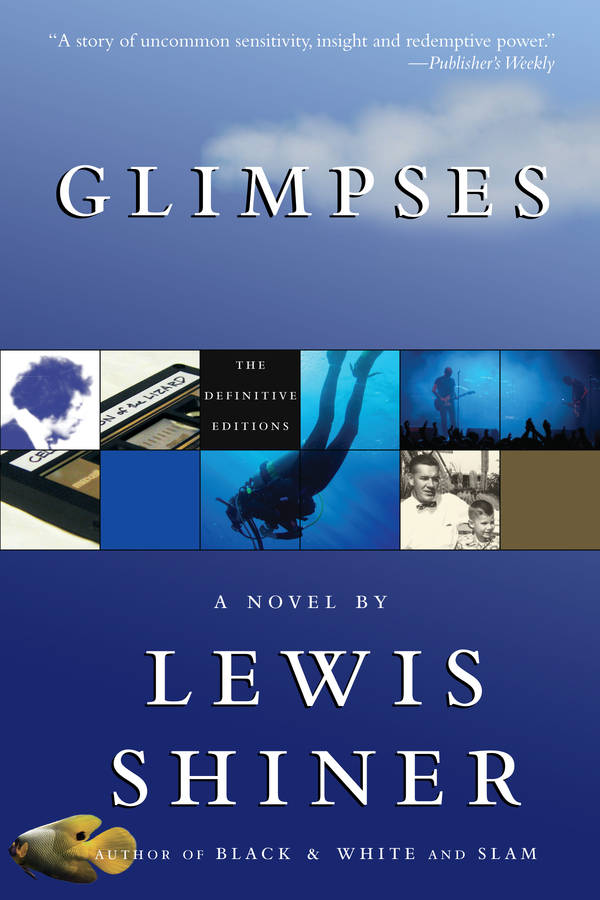 Wonderful news: Lewis Shiner's classic, World Fantasy Award-wining novel Glimpses is back in print for the first time since 2001, and Lew has released it as a a free PDF download to commemorate the re-release. The new edition is handsome and beautifully typeset. Glimpses is one of my favorite novels of all time; a haunting and sweet story about an alienated, lonely stereo repairman who discovers that he can slip into parallel dimensions in which the great, never-recorded rock albums (lost Beatles, Beach Boys, Hendrix, etc) may yet be made, and can bring recordings of the music back on his reel-to-reel. It's a rare novel that can capture the raw energy of rock and roll, but Glimpses has this and a tense, thrilling story besides. The free download is part of a larger project that Shiner calls The Fiction Liberation Front, through which he is gradually releasing his entire backlist. The reprint is from Subterranean Press, who have also just brought back Lew's debut novel Frontera, as well as much of Lew's earlier titles. |
| Aeropress: fast, portable, cheap, easy, delicious espresso Posted: 30 Aug 2010 05:10 AM PDT  When I decided to take a month off life and hide out at a cottage, I knew I wanted to rough it, but I wasn't about to give up on my morning espresso. So, thinking of Mark's beloved Aeropress machine, I picked one up. I found mine on the shelves at the genuinely excellent Crema coffee-shop in Toronto, and had them grind a couple pounds of each of their espresso roasts for me to try (this coffee went so fast that we ended up sending relations who were joining us later on detours to Crema -- we eventually killed something like 10 pounds of espresso, and I've brought home a couple pounds to enjoy in London). When I decided to take a month off life and hide out at a cottage, I knew I wanted to rough it, but I wasn't about to give up on my morning espresso. So, thinking of Mark's beloved Aeropress machine, I picked one up. I found mine on the shelves at the genuinely excellent Crema coffee-shop in Toronto, and had them grind a couple pounds of each of their espresso roasts for me to try (this coffee went so fast that we ended up sending relations who were joining us later on detours to Crema -- we eventually killed something like 10 pounds of espresso, and I've brought home a couple pounds to enjoy in London). The verdict? I give it an A, and on a good day, an A+. It's a very simple design: a plastic sleeve with a hollow plastic plunger that is tipped with a tight-fitting rubber tip. You screw a mesh lid onto the sleeve, insert a paper filter (these are reusable, but they're also tiny and cheap, and you get 350 of them with your Aeropress), and pile dry espresso grounds on top of the filter, and rest the whole thing on a sturdy cup or mug. Then you add a measured amount of 175°F water, stir for 10 seconds, and gently but forcefully depress the plunger. The espresso that emerged was uniformly delicious -- sweet, dark, and without a hint of bitterness. The theory behind the Aeropress is that you can get a better shot of espresso if you extract your coffee quickly, and at low temperatures. In order to do that, you need to really get the water into contact with the fine-ground coffee (hence the stirring step), so that you get a nice shot even without a lot of heat or time. This is not without its drawbacks: I never managed to get any crema onto any of my shots (looking at Aeropress message boards, I can see I'm not alone). Also, the shots that the Aeropress delivered were really short -- I found myself increasing the amount of water about one third above their recommended levels. Finally, the business of getting your water to 175 Fahrenheit is very fiddly (I used a $6 meat thermometer from Canadian Tire and clipped it to the mouth of the electric kettle). What's more, the Aeropress comes with a couple of largely useless accessories (a funnel and a stand for the filters), but omits the absolutely vital thermometer, which seems ill-considered. But the disadvantages are vastly outweighed by the advantages. As I said, the coffee is great (everyone who visited us or vice versa got a shot or two, most asked for seconds). The cleanup is really simple: the piston scours the sleeve clean of all grounds and oils, so all it wants is a rinse at the tip when you're done. And the setup is compact, portable, and requires no electricity (though you need some means of heating water). We combined it with a microwaved milk frothed with a little battery-powered whizzer, which was no substitute for properly frothed milk, but beat most chain-store milky espresso drinks hands down. At $30, the device is a very cheap way of making espresso, and despite the thermometer fiddling, I found it much easier to use than my traditional steam-driven machine in my kitchen. If you're trying it out, pay close attention to the instruction not to press too hard on the piston: just push in an inch or two, wait while the water permeates the grounds, then push the rest of the way in. I've put my Aeropress in my permanent travel kit. AeroPress Coffee and Espresso Maker with Bonus 350 Micro Filters |
| Cary Ann Hearst and the Agnostic Mountain Gospel Choir: dirty, thumpy, countrified tunes Posted: 30 Aug 2010 04:47 AM PDT 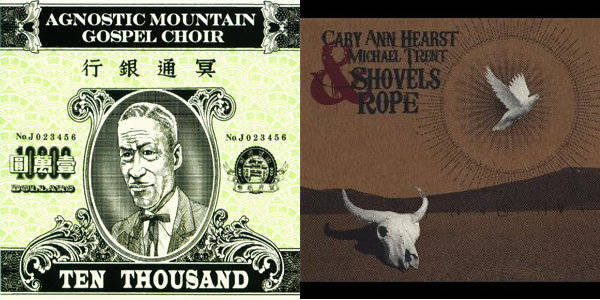 My recent family holiday involved a fair bit of driving, and my wife and I both tried out a lot of new (to us) music on one another, with two (very similar) artists emerging as clear favorites: Cary Ann Hearst has enjoyed a lot of recent public interest as a result of the use of her single Hell's Bells in an episode of True Blood. Alice and I both really dug this song -- a rocking, mean, countrified song that showcases Hearst's Joan-Jett-meets-Dolly-Parton-with-a-flanger vocals. But we got the most play out of Shovels and Rope, an album she recorded with Michael Trent. Shovels and Rope is filled with sloppy slide guitar, tub-thumping percussion, and more of Hearst's snakebite-mean vocals, though there are a few tracks that are straight-ahead lovelorn C&W tunes that might have stepped off the stage at the Grand Ole Opry. These country tunes are serviceable and even sweet, but we thought they felt almost like a formality, as though Hearst was saying, "I'm not just some psychobilly, I know country, I can do country, I do the strange stuff I do because I choose to, not because I must." Meanwhile, the grittier numbers are damned inspired, especially a cover of Charlie Feathers's I Can't Hardly Stand It, which tops all the other versions I've heard, including the one The Cramps recorded. I bought The Agnostic Mountain Gospel Choir's Ten Thousand on a whim at Brill, a wonderful coffee shop and record store in London's Exmouth Market, near my office (I almost never go wrong buying random stuff off the shelves at Brill). Like Shovels and Rope, Ten Thousand features a lot of stompy, open-strings slide guitar, loose percussion, thunderous railroad rhythms and growling vocals that are filled with portent. I'm biased towards uptempo music, so I love tracks like You Got it Wrong. The overall album has some of Jeff Healey's roadhouse feel, but with a lot more countrification than Healey generally slipped in. It made a great counterpoint to the Hearst/Trent album, and we played them on shuffle together for most of the trip. |
| My Melbourne schedule: Melbourne Writers' Festival and World Science Fiction Convention Posted: 30 Aug 2010 04:16 AM PDT I've just done the online checkin for my flight to Australia tomorrow for the Melbourne Writers' Festival and the World Science Fiction Convention (also in Melbourne), so now seems like a good time to publish my schedule of appearances for the week that I'm there: Melbourne Writers' Festival: (Note: the seminar announced for Sept 1 has been rescheduled; I'll post here when I have the final info) World Science Fiction Convention: Making a living: Professional writing for speculative fiction authors (Friday, Sept 3, 1200h, Room 219) Copyright in the 21st Century (Saturday, Sept 4, 1000h, Room 203) To market: How to sell your short stories (Saturday, Sept 4, 1100h, Room P3) Did the future just arrive?: The e-book and the publishing industry (Saturday, Sept 4, 1300h, Room P3) The writer and the audience: Online interaction and public personae (Saturday, Sept 4, 1500h Room 204) Reading (Sunday, Sept 5, 1000h) Kaffeeklatsch (Sunday, Sept 5, 1100h) The future of short fiction (Monday, Sept 5, 1100h, Room 203 Dirty feed (Monday, Sept 5, 1200h, Room 210) |
| Even Monsters Need Haircuts: kids' book full of great monsters Posted: 30 Aug 2010 04:04 AM PDT 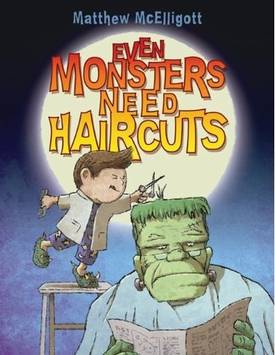 Matthew McElligott's Even Monsters Need Haircuts is a cute picture book about a boy who sneaks into his father's barbershop every full moon and gives haircuts to all the neighborhood monsters. It's full of sight gags -- barbering a gorgon while wearing a blindfold; cutting Frankenstein's monster's hair with a clipper that's plugged into one of his neck bolts -- and complex pictures filled with tons of interesting monsters with extra limbs, eyes, heads, etc, to talk about with your kids. Matthew McElligott's Even Monsters Need Haircuts is a cute picture book about a boy who sneaks into his father's barbershop every full moon and gives haircuts to all the neighborhood monsters. It's full of sight gags -- barbering a gorgon while wearing a blindfold; cutting Frankenstein's monster's hair with a clipper that's plugged into one of his neck bolts -- and complex pictures filled with tons of interesting monsters with extra limbs, eyes, heads, etc, to talk about with your kids. I brought a copy along on the summer family holiday and it quickly became the favorite of my two-and-a-half year old daughter and three-and-a-half year old nephew, who demanded to hear it read until they'd memorized it. The grownups in the cottage liked the scene where the monsters all help the boy clean up the barbershop at the end of the night, and we made reference to it every time we tried to get the kids to clean up their toys (it worked pretty well!).
|
| Charlie Brooker on the "Ground Zero Mosque" Posted: 30 Aug 2010 01:28 AM PDT Writing in the Guardian, Charlie Brooker contemplates the mystery of the American myth of a "Ground Zero Mosque": The planned "ultra-mosque" will be a staggering 5,600ft tall - more than five times higher than the tallest building on Earth - and will be capped with an immense dome of highly-polished solid gold, carefully positioned to bounce sunlight directly toward the pavement, where it will blind pedestrians and fry small dogs. The main structure will be delimited by 600 minarets, each shaped like an upraised middle finger, and housing a powerful amplifier: when synchronised, their combined sonic might will be capable of relaying the muezzin's call to prayer at such deafening volume, it will be clearly audible in the Afghan mountains, where thousands of terrorists are poised to celebrate by running around with scarves over their faces, firing AK-47s into the sky and yelling whatever the foreign word for "victory" is.'Ground Zero mosque'? The reality is less provocative (via Wonderland) |
| Posted: 30 Aug 2010 01:24 AM PDT 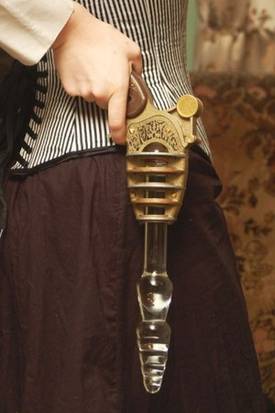 Lady Clankington's Cabinet of Carnal Curiosities sells steampunk raygun vibrators for sexy steampunk bedroom fun. You can play stern neo-Victorian explorer and naughty morlock, or any variation that tickles your fancy. Lady Clankington's Cabinet of Carnal Curiosities sells steampunk raygun vibrators for sexy steampunk bedroom fun. You can play stern neo-Victorian explorer and naughty morlock, or any variation that tickles your fancy. Lady Clankington's Cabinet of Carnal Curiosities! (via JWZ) |
| Home entertainment center predictions, 1959 Posted: 30 Aug 2010 01:20 AM PDT 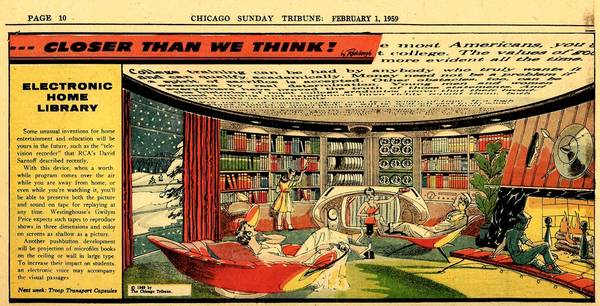 Here's a vision of an "electronic home library" from a 1959 edition of Closer Than We Think, a futuristic newspaper strip drawn by Arthur Radebaugh: "Some unusual inventions for home entertainment and education will be yours in the future, such as the 'television recorder' that RCA's David Sarnoff described recently. With this device, when a worthwhile program comes over the air while you are away from home, or even while you're watching it, you'll be able to preserve both the picture and sound on tape for replaying at any time. Westinghouse's Gwilym Price expects such tapes to reproduce shows in three dimensions and color on screens as shallow as a picture." |
| Which ebook sellers will allow publishers and writers to opt out of DRM? Posted: 29 Aug 2010 11:25 PM PDT My August Publishers Weekly column reports in on my experiment to see which of the major ebook stores would carry my books without DRM, and with a text disclaimer at the beginning that released readers from the crazy, abusive license agreements that most of these stores demand as a condition of purchase. Amazon, Barnes and Noble and Kobo were all happy to carry my books without DRM, and on terms that gave you the same rights you got when buying paper editions. Sony and Apple refused to carry my books without DRM -- even though my publisher and I both asked them to. The upshot is that you can now buy electronic editions of my books in the Kindle, Nook and Kobo stores in DRM-free, EULA-free editions! In May, I cornered Macmillan CEO John Sargent and CTO Fritz Foy at the Macmillan BEA party. As the publishers of my books with Tor, I asked them if they'd be willing to try offering my e-books to all the major online booksellers--Amazon's Kindle store, Apple's iPad store, Barnes & Noble's Nook store, Sony's e-book store, and Kobo--as DRM-free products with the following text inserted at the beginning of the file:Doctorow's First Law
|
| Survey and comparison of fantasy novel cover art, 2008/9 Posted: 29 Aug 2010 11:17 PM PDT 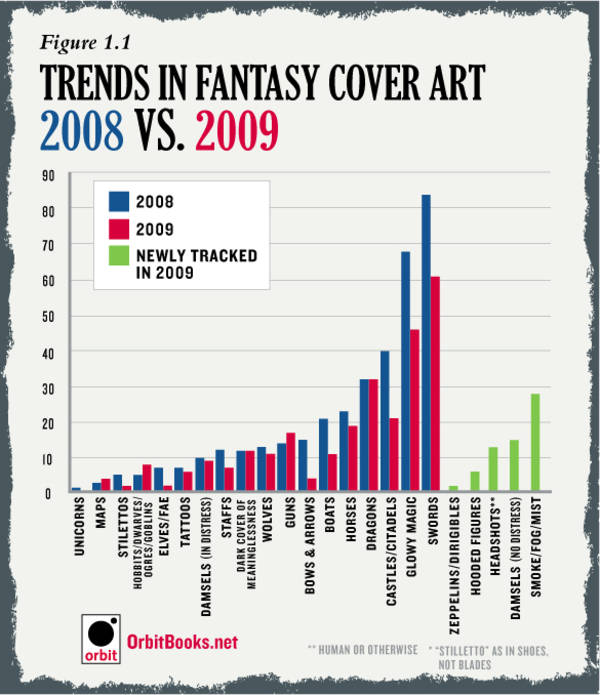 Every year, Orbit Books's summer intern conducts a survey of fantasy novel cover-art for the year. This year, Orbit is releasing the data as a series, with commentary. Fascinating stuff: 'We have concrete evidence that the big three fantasy cover clichés ("castles", "glowy magic", and "swords") are in decline. The 50% reduction in castles can only mean one thing.' The Chart of Fantasy Art, 2009 (via Making Light)
|
| Amy Crehore letterpress print Shygals' Serenade Posted: 29 Aug 2010 06:32 PM PDT  Amy Crehore has a terrific new limited edition 3-color letterpress print called Shygals' Serenade. I'm getting mine framed this week! It is printed with archival inks on Holyoke Premium Cotton 140# paper. Size: 11 3/16" x 8" image on 13" x 10" paper. Signed and numbered by the artist. Also comes with a certificate of autheticity signed by the artist. Edition size: 170. Featuring: 2 gals, 2 monkeys and 1 ukulele. Amy Crehore created an original ink drawing with color separations on acetate for this fine art print. Copyright 2010 Amy Crehore. New customers will receive postcards with orders. $50. + $10. Shipping/handling = $60. |
| 10 Rules for Radicals: Lessons from rogue archivist Carl Malamud Posted: 29 Aug 2010 12:48 PM PDT Rogue archivist Carl Malamud's 10 Rules for Radicals is the transcript of his keynote at the 19th World Wide Web Consortium conference in 2010. It's a thrilling and often hilarious account of his adventures in liberating different kids of information and networks from various bureaucracies in his storied and exciting career. Malamud has instigated the liberation of American law, the Blue Book describing the workings of the telephone system, the EDGAR database, the video archives of the National Technical Information Service, and many others. On the way, Malamud boils his experience down to ten amusing and useful rules for people who want to do the same work, including "When the authorities fire the starting gun [and authorize the experimental liberation of some data], run as fast as you can, so when they get that queasy feeling in their stomach and have second thoughts, it is too late to stop," and "Get standing: one can criticize government all one wants, and they'll often ignore you. But, if there is something clearly wrong and against the law and you can document that malfeasance and wrongdoing, they have to talk to you. If you have standing, you can insist." It's all so engagingly written, and so useful, that it is truly a must-read for anyone interested in the history or future of universal access, open networks and free societies. 10 Rules for Radicals (Thanks, Carl!)
|
| Homeowners' associations: hives of petty authoritarianism Posted: 29 Aug 2010 11:01 AM PDT Academics may "fight so hard because the stakes are so low," but housing association tinpot dictators fight hard over high stakes indeed: the power to run your neighbors' lives down to the tiniest little detail. Here's a collection of seven insane homeowners' association rules, every one of them abusively applied, putting a lie to the old chestnut about not worrying about crazy rules because they'll never be enforced. 1. Thou shalt not plant too many rosesTop 7 insane homeowners association rules (via Making Light) |
| Kisai Traffic: telling the time with stylized animated traffic-maps Posted: 29 Aug 2010 10:20 AM PDT  The latest gloriously impractical Kisai watch from TokyoFlash is the Traffic, a watch that displays the time as an animated traffic map -- the $170 LED-watch recharges with USB. |
| Govt to Scouts, 1917: take down your radios! Posted: 29 Aug 2010 10:15 AM PDT 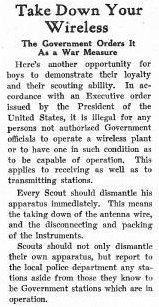 This brief article from the June, 1917 issue of Boys' Life (a magazine for Boy Scouts) urges scouts to disassemble their wireless sets and turn in suspicious friends who refuse to stop using radio while WWI is raging. This brief article from the June, 1917 issue of Boys' Life (a magazine for Boy Scouts) urges scouts to disassemble their wireless sets and turn in suspicious friends who refuse to stop using radio while WWI is raging. Take Down Your Wireless (Thanks, Andrewmedley via Submitterator!) |
| Posted: 29 Aug 2010 10:10 AM PDT
Here's some clever (if initially long-winded) CGI video of Darth Vader doing a 42-movement Tai Chi sword form, created by John Leo. It works very well, presumably because the lightsaber choreography has some nexus with actual swordplay, as do Tai Chi's stylized sword forms. Star Wars Tai Chi (Thanks, RJ!) |
| Lewis "The Gift" Hyde talks Creative Commons and sharing Posted: 29 Aug 2010 10:06 AM PDT A reader writes, "Creative Commons has published an extensive interview with Lewis Hyde, author of the modern classic 'The Gift: Creativity and the Artist in the Modern World' and a brand new, deeply historical book on the cultural commons, 'Common as Air: Revolution, Art, and Ownership'." Lewis Hyde, author of Common as Air: Revolution, Art, and Ownership |
| Lynd Ward's wordless, Depression-era woodcut novels Posted: 29 Aug 2010 01:15 PM PDT 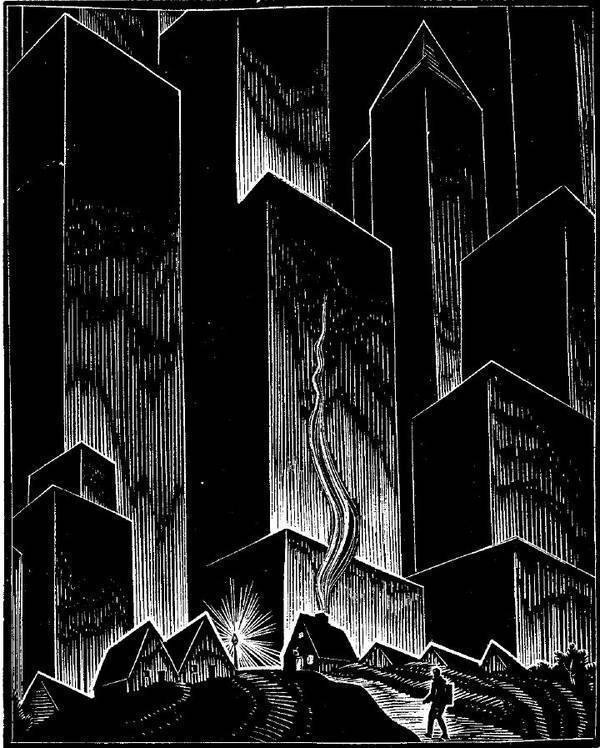 Library of America has announced a slipcased two-volume set collecting Lynd Ward's gorgeous, Depression-era woodcut "novels" -- wordless, book-length stories told in stark imagery. The set is edited by Art Spiegelman, and LoA has a short interview (PDF) with Spiegelman on Ward's work. See LoA's Lynd Ward page for more info on the books (with visuals) or pre-order a copy at Amazon. Lynd Ward: Six Novels in Woodcuts (Thanks, Kirk!) |
| How to get a lecture hall full of people to make Chewbacca sounds Posted: 27 Aug 2010 07:08 AM PDT To promote a student conference, here is a little video I made recently: p.s. If you're a student and at the University of British Columbia, you should totally check out the TEDxTerrytalks conference, and even apply if you think you've got something interesting to say. It's awesome! |
| You are subscribed to email updates from Boing Boing To stop receiving these emails, you may unsubscribe now. | Email delivery powered by Google |
| Google Inc., 20 West Kinzie, Chicago IL USA 60610 | |

















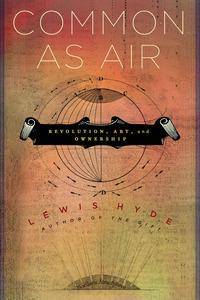 It is surely the case that the GPL has antecedents in gift cultures. As I explain in The Gift, one old ethic asks that gifts be "kept in motion"; they ought to be passed along in the same spirit with which they were received. Put another way, in a gift culture one is not supposed to capitalize on the generosity of others or of the community.
It is surely the case that the GPL has antecedents in gift cultures. As I explain in The Gift, one old ethic asks that gifts be "kept in motion"; they ought to be passed along in the same spirit with which they were received. Put another way, in a gift culture one is not supposed to capitalize on the generosity of others or of the community. 


No comments:
Post a Comment